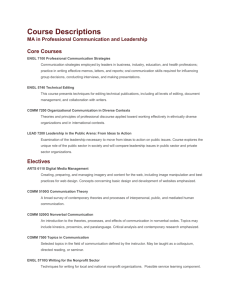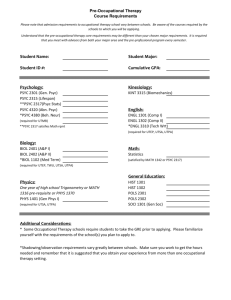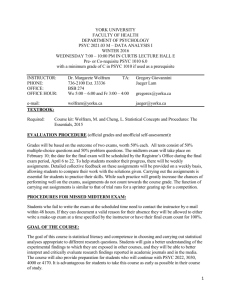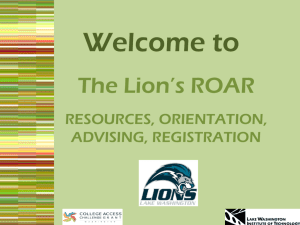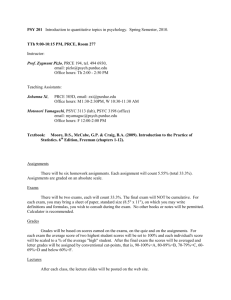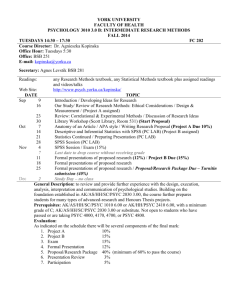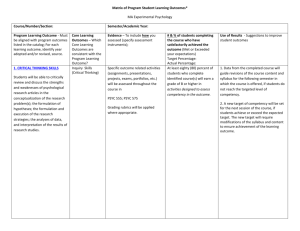STAGES ON PAGES: LIFESPAN AND LITERATURE, THE BOOKS
advertisement
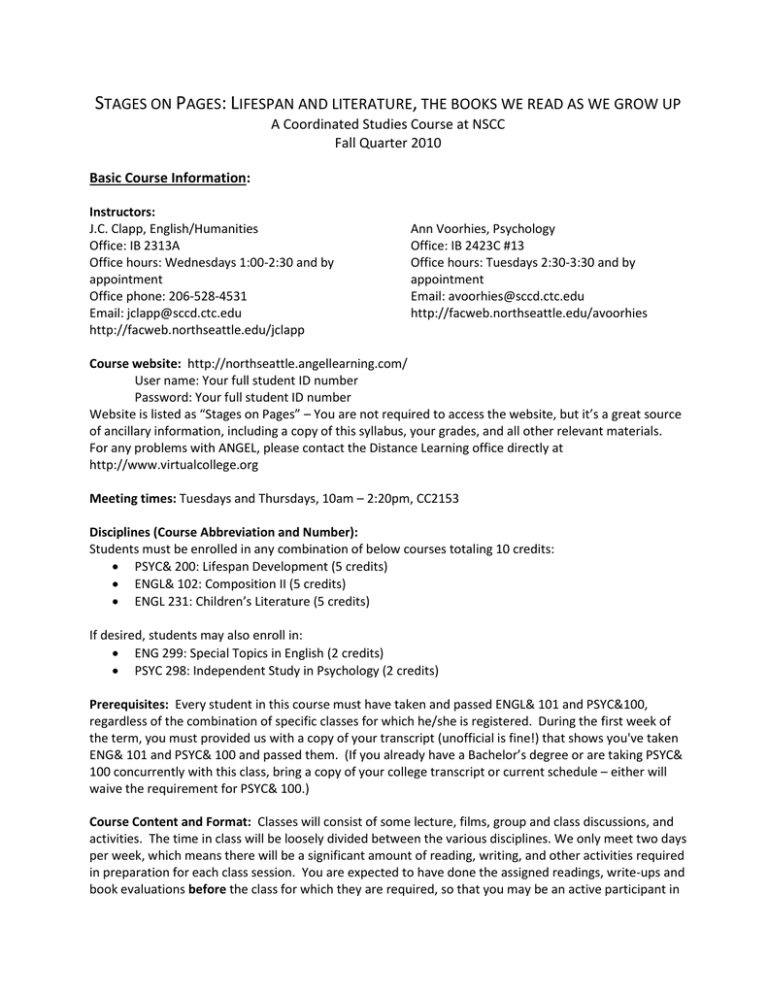
STAGES ON PAGES: LIFESPAN AND LITERATURE, THE BOOKS WE READ AS WE GROW UP A Coordinated Studies Course at NSCC Fall Quarter 2010 Basic Course Information: Instructors: J.C. Clapp, English/Humanities Office: IB 2313A Office hours: Wednesdays 1:00-2:30 and by appointment Office phone: 206-528-4531 Email: jclapp@sccd.ctc.edu http://facweb.northseattle.edu/jclapp Ann Voorhies, Psychology Office: IB 2423C #13 Office hours: Tuesdays 2:30-3:30 and by appointment Email: avoorhies@sccd.ctc.edu http://facweb.northseattle.edu/avoorhies Course website: http://northseattle.angellearning.com/ User name: Your full student ID number Password: Your full student ID number Website is listed as “Stages on Pages” – You are not required to access the website, but it’s a great source of ancillary information, including a copy of this syllabus, your grades, and all other relevant materials. For any problems with ANGEL, please contact the Distance Learning office directly at http://www.virtualcollege.org Meeting times: Tuesdays and Thursdays, 10am – 2:20pm, CC2153 Disciplines (Course Abbreviation and Number): Students must be enrolled in any combination of below courses totaling 10 credits: PSYC& 200: Lifespan Development (5 credits) ENGL& 102: Composition II (5 credits) ENGL 231: Children’s Literature (5 credits) If desired, students may also enroll in: ENG 299: Special Topics in English (2 credits) PSYC 298: Independent Study in Psychology (2 credits) Prerequisites: Every student in this course must have taken and passed ENGL& 101 and PSYC&100, regardless of the combination of specific classes for which he/she is registered. During the first week of the term, you must provided us with a copy of your transcript (unofficial is fine!) that shows you've taken ENG& 101 and PSYC& 100 and passed them. (If you already have a Bachelor’s degree or are taking PSYC& 100 concurrently with this class, bring a copy of your college transcript or current schedule – either will waive the requirement for PSYC& 100.) Course Content and Format: Classes will consist of some lecture, films, group and class discussions, and activities. The time in class will be loosely divided between the various disciplines. We only meet two days per week, which means there will be a significant amount of reading, writing, and other activities required in preparation for each class session. You are expected to have done the assigned readings, write-ups and book evaluations before the class for which they are required, so that you may be an active participant in class discussion and activities. Expect to spend at least 20 hours per week reading and preparing for class. Central theme addressed: The stories we tell ourselves and our children reflect our cultural values. We will be looking closely at the scientific method as applied to the study of human development; research and theories of human development; the role of heredity and environment in shaping biological, cognitive and psychosocial development throughout the lifespan; as well as cultural issues and traditions surrounding death and dying. As we progress through the stages of human development, we will study the diverse literature that aligns with each of these developmental stages. Course outcomes: Upon successful completion of ENGL 102, students will be able to: 1. To read critically in order to analyze, discuss, evaluate and respond to texts. 2. To write in order to discover the meanings in texts of others. 3. To write in order to discover one’s own ideas in relation to the texts of others. 4. To develop the skills of writing to communicate ideas to a particular audience. In this class, that will include other students as well as the teachers. 5. To paraphrase, quote, and cite sources according to conventional MLA form, and to integrate source materials smoothly into their own words in order to add support and emphasis to their own writing. 6. To produce writing that has been revised, edited, and proofread, and to submit the work on time. 7. To continue developing one’s voice as a writer. 8. To conduct limited, focused research and evaluate sources and information. Upon successful completion of ENGL 231, students will be able to: 1. To gain new insights into the range, richness, elements, and techniques of children’s and adolescent literature; and to gain an appreciation of this rapidly expanding body of literature as part of our literary art, an essential human and cultural phenomenon. 2. To explore children’s literature and adolescent literature as a means of learning about diverse cultures within the United States; to distinguish between children’s literature which makes blatant appeals to the popular myths of a culture and that which achieves more subtle examinations of moral and social issues. 3. To learn to evaluate the literature for young people by the same literary and artistic considerations that can be brought to all serious literature. 4. To become aware of the psychological, social, and moral implications of children’s and adolescent literature. 5. To gain skills in working as a class group and within groups toward the shared understanding of ideas and issues; to appreciate diversity of perceptions as an opportunity for learning. 6. To understand the critical and creative aspects of writing as process; toward this goal, to learn to work effectively in writing groups. 7. Through our reading, to gain insight into the nature of the individual, most frequently in this class the child or adolescent, and the relationship between that child and the community. Upon successful completion of PSYC 200, students will be able to: 1. To discuss the goals and issues involved in the study of human development across the lifespan, citing issues appropriate to different developmental stages. 2. To describe the biological, cognitive and psychosocial aspect of development at different life stages. 3. To describe the social factors affecting human development, including cultural, historical, and socioeconomic contexts. 4. To describe the scientific research methods used to test hypotheses about age-related changes in behavior, noting the advantages and limitations of each method. 5. To compare and contrast different theories of cognitive and psychosocial development. 6. To evaluate and apply research findings and different theories of human development to effectively address problems that may occur at each stage of development, including those that may occur in the student’s own life. ENGL 299/PSY 298 Credit: ENGL 299 and PSYC 298 are optional 2-credit classes that students can take in conjunction with the 10-credit “Stages on Pages” Coordinated Studies class. Each 2-credit class requires approximately 40-50 total hours of work in addition to the work for our Coordinated Studies course. The grade for the ENGL 299/ PSYC 298 course will be independent of the grade given in the Coordinated Studies classes. ENGL 299/ PSYC 298 is a student-driven course with some instructor oversight, but you, as the student, are expected to be independent and responsible for your own learning and work. If you are a PSYC 298 student, contact Ann to make arrangements for your independent study. If you’re in ENGL 299, contact JC. Required Reading: Textbooks to be Purchased: They Say I Say: The Moves that Matter in Academic Writing, 2nd edition, by Graff & Birkenstein ISBN: 978-0393933611 Charlotte Huck's Children's Literature: A Brief Guide, by Kiefer and Tyson ISBN: 9780073403830 Invitation to the Lifespan, 1st edition, by Kathleen Stassen Berger ISBN: 9780716754664 Children’s Books to be Acquired: Maurice Sendak: Where the Wild Things Are Claire Huchet Bishop and Kurt Wiese: The Five Chinese Brothers Arlene Mosel (1968): Tikki Tikki Tembo Any version of the story of Cinderella you can find Katherine Paterson: Bridge to Terabithia Judy Blume: Are you there God, It's me Margaret Sherman Alexie: The Absolutely True Diary of a Part-Time Indian Lois Lowry: The Giver Robie Harris: It’s Perfectly Normal: Changing Bodies, Growing Up, Sex, and Sexual Health Natalie Babbitt: Tuck Everlasting E.B. White: Charlotte’s Web You are required to bring a copy of textbooks with you daily. Also, bring the children’s books to class on the day that they will be discussed; however, you are not required to purchase the children's books. You may choose to check them out from the library. You have several library options: Seattle Public Library: http://www.spl.org/ King County Library: http://www.kcls.org/ Sno-Isle Libraries: http://www.sno-isle.org North Seattle Community College Library: http://dept.sccd.ctc.edu/nslib/ You will have to plan ahead so that you are able to get to the library and find the children's books you need (and read them) before class, so budget your time accordingly. If you wish to buy the books, abebooks.com has excellent prices on (mostly used) books. Shipping is slow – again, plan accordingly. Class Policies: Attendance: As class participation is part of your grade, regular attendance is essential to your success in this class. You are expected to arrive on time and stay for the entirety of the class. Attendance will be taken during each class. If you aren’t present when attendance is taken, you will be marked absent. Classroom etiquette: No electronic devices are allowed in our classroom. Please turn off all such devices (including, but not limited to: cell phones, laptops, iPods, pagers, and translators) before the start of class and put them away in your bag. There will be a break in the middle of class; you may use your electronics at that time only. Policy on late assignments and missed exams: All assignments are due at the beginning of class, and may not be made-up. If you feel you will not be able to make the deadline on a final draft of a paper or take an exam on time, you may come to us in advance and request an extension (although an extension is not guaranteed). However, absolutely no late assignments will be accepted, and no make-up exams will be given, without a previously granted extension. You must turn in your assignments in hard-copy at 10:00 a.m. or else you will earn a zero on the assignment. We will not accept assignments by email. Grading: Grades will not be based on students’ expressed level of effort; rather, all work will be graded objectively, based on what is on the page. Although the time and effort you put into the assignments will likely be reflected in the quality of your work, we will only be grading the final product. For each paper there will be grading criteria attached to the assignment sheet. We will use those grading criteria to objectively assess each student’s work. Your final course grades will be based on: Papers: 100 points each (x3) = 300 points Exams: 100 points each (x3) = 300 points Children’s Book Evaluations: 10 points each (x10) = 100 points Psychology Reading Write-Ups (15 total): 2 points or 16 points each (x15) = 100 points Participation: 2 points per day (x20) = 40 points You are responsible for keeping track of how you are doing in the course. Check the gradebook on the course website regularly, so that you are aware of your current standing. The grade given at the end of the quarter will be based on a 4.0 scale. No grades of I (“incomplete”) or NC (“no credit”) will be granted except in the most extreme circumstances. If you do not feel you will be able to complete the course to your satisfaction, it is your responsibility to drop/withdraw from the course. The last day to withdraw: 11/19/10. For information on withdrawing and other registration questions: http://www.northseattle.edu/enroll/admit/policy/chsched.htm Plagiarism: Because this class involves writing projects, it is imperative that you understand what constitutes plagiarism. If all or part of your assignment is identical (or very similar) to another student’s work, the original sources of the information, or another source, it will appear that you are guilty of plagiarism. Your work MUST be your own and original for the current assignment. Any work found to contain plagiarized material will earn a zero on the assignment, and you will be reported to the Dean of Student Services for disciplinary action. If you include words or ideas from another source, please cite them appropriately to avoid plagiarism. Assignment Descriptions: This is a brief overview of the various assignments. Detailed assignment sheets will be handed out in class as well as posted to our class website. Papers - Three major papers (Paper #1, Paper #2, Paper #3) will be due throughout the quarter. Each paper is worth 100 points. These papers will be asking you to demonstrate that you can integrate the concepts of Children’s Literature and Lifespan Development. Exams – Three exams throughout the quarter. Each exam will be worth 100 points. Exams will be based on lectures, assigned reading and projects. Exam Appeals - If you feel that an answer marked as incorrect is legitimately correct, you may submit an appeal in writing. To have your appeal considered, submit a carefully thought out, typed explanation of which question you got wrong and why you feel that the answer you selected is correct. You must justify your answer with information from the notes or reading. Rebuttals containing the words "In my opinion" will not be considered. We will gladly consider all facts presented, but this is not debate class. You are not tested on your opinions. We will consider all appeals adhering to the instructions above, but cannot guarantee a change in your grade. All exam appeals are due no later than one week (7 days) following the posting of test grades, and may be submitted in person or via email. Children’s Book Evaluations – For each assigned children’s book, you are required to submit a book evaluation based on the criteria found in the Children’s Literature chapter about that type of book. Each evaluation will be about two pages in length. There are 10 due, at 10 points each. Psychology Reading Write-Ups - For each reading assignment in Invitation to the Lifespan, you are required to submit a one-page reading write-up consisting of a reflection on, and questions about, the reading. Fifteen reading responses are due throughout the quarter. Five responses will be graded for quality and effort, and these will be worth 16 points each (total: 80 points). The other 10 responses will be graded for completion, and will be worth 2 points each (total: 20 points). Participation – This includes coming to class on time every day, keeping up with the readings, paying attention to the instructor AND your classmates, and participating in class activities and discussions. Your participation grade will be based on the quality of your contribution to the class, not the quantity. Please keep in mind that this is a college class – not a therapy session, debate club, or a personal forum. Resources Available: The Loft Writing Center: The Loft is the campus language lab/writing center, located on the top floor of the library. One of the primary attributes of The Loft is the free tutoring! Tutoring sessions last 30 minutes, are held on a first-come, first-served basis, and can help you with reading, writing, grammar, listening and speaking. They also do online tutoring. In general, the more a student uses the Loft services, the higher his/her grades tend to be. http://www.northseattle.edu/services/loft/ Disability Services: To request academic accommodations due to a disability, contact Disability Services (206-527-3697; ds@sccd.ctc.edu; Room CC 2346A). Provide us with a letter from DS indicating the accommodations required, so that we can discuss your needs for the class. http://www.northseattle.edu/services/disability/ Counseling Center: The counseling center provides an array of free academic support services, including consultations on study skills, test taking, concentration issues, and stress management. They are also available to help students with career counseling and stress management; they offer support for both academic and personal issues. They are located in the College Center 2346A, 527-3676. http://www.northseattle.edu/services/counseling Your Instructors: Obvious, but often overlooked! Our office hours are listed at the top of this syllabus, and we are both available at other times – just ask. Come to see us with questions or for help with any aspect of the class. We’re happy to help!

